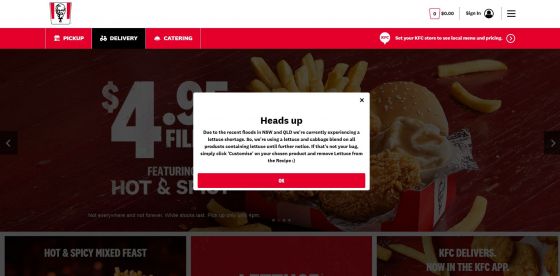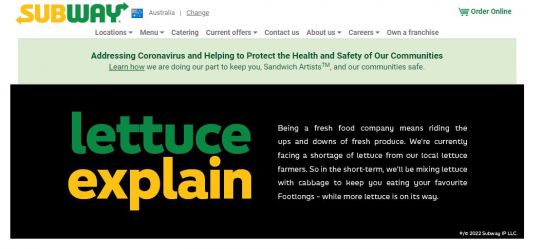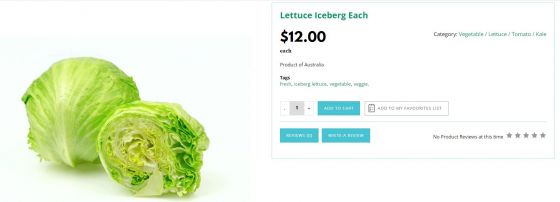Australia’s lettuce crisis isn’t just driving up grocery prices for the everyday shopper, but also forcing fast-food chains like KFC and Subway to add cabbage to burgers and subs.
KFC was the first fast-food giant to post a notice on its website to notify customers that lettuce in some menu items would be substituted with a ‘lettuce and cabbage blend’.
“We’ve hit a bit of an Iceberg and are currently experiencing some lettuce supply chain disruptions due to the impacts of the recent Queensland and NSW floods. This means you may see a temporary blend of lettuce and cabbage throughout KFC restaurants in NSW, VIC, QLD, ACT, and TAS during these shortages,” the notice said.

Customers who don’t want cabbage in their food can choose to remove ‘lettuce’ from their order. It’s the latest in a string of changes KFC has had to make in response to supply chain issues. Earlier this year, it was forced to offer a ‘reduced menu’ due to a chicken shortage.
Subway followed suit and announced it will also be temporarily mixing the salad staples together amid the lettuce shortage.
A notice on the Subway website said: “Lettuce explain: Being a fresh food company means riding the ups and downs of fresh produce. We’re currently facing a shortage of lettuce from our local lettuce farmers. So, in the short-term, we’ll be mixing lettuce with cabbage…while more lettuce is on the way.”

Other fast-food chains like Getta Burger have also removed lettuce from their menu and encouraged customers to substitute it for fries, cheese, or slaw.
Iceberg lettuce has recently been selling for $12 a head in some supermarkets – although shoppers were paying just $2.80-$3 a pop just a few weeks ago.
But, it’s not just the price of lettuce that’s skyrocketed – a recent Canstar Blue survey revealed a whopping 71% of Australian shoppers have noticed an increase in the overall cost of groceries, especially on fruits and vegetables, meat, dairy products, and bread.
The lettuce shortage and subsequent price hikes have been attributed to heavy rain and floods spoiling crops in NSW and Queensland.

You may also be interested in:
- How a simple supermarket switch could save you up to $2,468 a year
- What is unit pricing? How to work out the REAL cost of groceries
- What is the average grocery bill?
Why is lettuce so expensive?
Bad weather isn’t solely to blame for the exorbitant cost of lettuce. There’s also inflation which surged to 5.1% in the last quarter (the highest level since the introduction of the GST in 2000).
Labour shortages in the agricultural industry have also resulted in crop losses and forced farmers to recoup costs by increasing their prices. This was compounded by an increase in freight costs due to rising petrol and diesel prices − most produce is transported from farmers/suppliers to supermarkets and other vendors by trucks. These increases in costs along the supply chain always get passed on to customers. The Russia-Ukraine war and the pandemic aftermath have also contributed to Australia’s supply chain woes.

Share this article